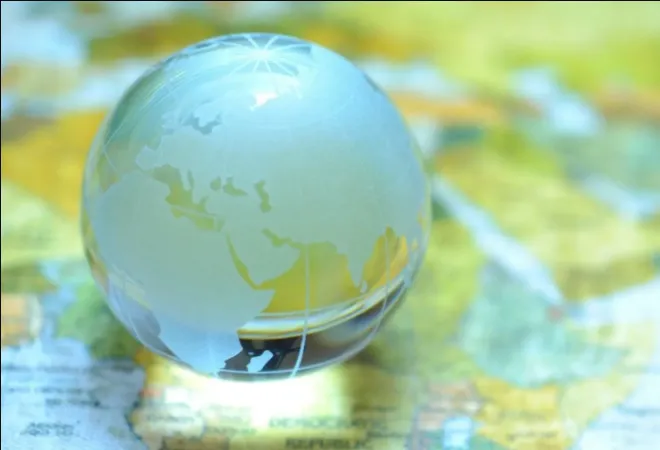-
CENTRES
Progammes & Centres
Location
By reforming policy frameworks and promoting responsible global economic governance, globalisation could prioritise inclusive growth, social equity, and sustainability

The later part of the 20th century witnessed the emergence of globalisation as a concept aimed at fostering fair and equitable development on a global scale. However, the pace at which economists predicted global integration has fallen short of expectations. Rather than being solely an economic concern, globalisation has become a subject of political discourse. Delving into the historical context, contrasting viewpoints, and significant events shaping the trajectory of globalisation helps gain insights into the complexities of globalisation and its implications for the global economy.
Development studies gained prominence in the post-World War II era, aiming to address the economic growth disparities amongst countries previously exploited during the colonial period. While some nations strategically combined modern techniques with government interventions to foster inter-country trade and economic partnerships, many newly independent poorer nations adhered to traditional market systems. This scepticism towards globalisation was fuelled by nationalistic sentiments and the perceived unequal distribution of benefits, particularly prevalent in Global South countries such as India, Bangladesh, and Pakistan.
While some nations strategically combined modern techniques with government interventions to foster inter-country trade and economic partnerships, many newly independent poorer nations adhered to traditional market systems.
Amartya Sen argues that resisting globalisation would be a costly error in the long run. He points out that historical examples, such as the invention of printing technology by the Chinese civilisation and the translation of ancient Indian texts into Chinese, debunk the notion of modernisation originating solely from the West. In fact, the oldest known printed book in the world, Vajracchedikā Prajñāpāramitā Sūtra (also known as the 'Diamond Sutra'), was a Sanskrit discourse on Buddhism from India that was translated into Chinese in the 5th century AD by an Indian-Turkish man named Kumarajiva. Sen asserts that globalisation possesses a time-independent, dynamic, and multi-directional character, highlighting its potential to facilitate cultural exchange and progress.
On the other hand, Joseph Stiglitz, a world-renowned economist, advocates for radical changes in the policy frameworks governing contemporary globalisation. He contends that the existing system must undergo significant reforms to promote economic convergence and social equity. Key issues such as illiteracy, healthcare challenges, corruption, and inadequate disaster management are fundamental problems that the state-led mechanisms of globalisation have failed to address effectively.
The 1990s witnessed a paradigm shift with the emergence of the Washington Consensus framework, which emphasised state deregulation and the opening up of capital and commodity markets to enhance global competitiveness and the development of domestic economies. Despite criticism for exacerbating economic inequality and environmental degradation, countries like India experienced rapid growth by embracing macroeconomic openness. The establishment of the North American Free Trade Agreement (NAFTA) between Canada, the United States (US) and Mexico in 1994 emerged as a testament to trade openness. This development stood in stark contrast to the prevailing pessimism surrounding globalisation in the preceding decade.
Despite criticism for exacerbating economic inequality and environmental degradation, countries like India experienced rapid growth by embracing macroeconomic openness.
However, the Asian Currency crisis in 1997 exposed the pitfalls of globalisation, particularly in Southeast Asian nations highly integrated into the global market. Criticisms arose from the significant gap between theoretical predictions and practical outcomes of international policies, especially regarding financial market integration and foreign investments. The global economy faced another severe setback with the 2007-2008 Global Financial Crisis, triggered by the burst of the US housing bubble. Only between June 2007 and November 2008, Americans lost more than one-third of their average net worth. The subsequent market selloffs and surging unemployment rates severely impacted interconnected economies worldwide, also leading to European sovereign debt crises.
More recently, the COVID-19 pandemic disrupted global economic growth due to overreliance on Chinese manufacturing and subsequent supply chain disruptions. Lockdowns, restrictions, and resource shortages have further exacerbated market imbalances and hindered the recovery process. China's Zero-COVID policy, marked by strict lockdown measures, faced domestic and international criticism for its impact on the global economy.
Finally, the Ukraine-Russia conflict has had profound implications for globalisation. The war has exposed the risks associated with global trade's interconnected nature, leading to disruptions in global value chains and prompting firms to re-evaluate the balance between efficiency and security. Additionally, the conflict has caused economic hardship and triggered a refugee crisis, impacting labour markets and social systems beyond Ukrainian or Russian borders. The global economy faces slower growth and higher food and energy inflation risks due to the war's effects on various commodity prices and disrupted trade. There is a potential shift from global to regional sourcing as supply chains are further disrupted. The conflict has questioned the resilience of global economic dynamics and the future of international economic interdependence.
The war has exposed the risks associated with global trade's interconnected nature, leading to disruptions in global value chains and prompting firms to re-evaluate the balance between efficiency and security.
Moreover, the South Asian region is currently experiencing significant macroeconomic challenges. Sri Lanka and Pakistan have encountered drastic economic circumstances, with the former having undergone a severe economic collapse and the latter dealing with substantial external debts, power shortages, and extreme inflation. Both countries are now dependent on financial assistance from the International Monetary Fund (IMF). Additionally, amidst Bangladesh's precarious macroeconomic conditions, marked by high inflation and volatility of the Bangladeshi Taka, the IMF has approved a precautionary loan of US$4.7 billion. In Myanmar, too, following the coup in February 2021, there has been a closure of businesses and a sharp rise in unemployment. Nepal also faces issues, including expanding trade deficits, and diminishing foreign exchange reserves.
As the global community grapples with the enduring challenges posed by the COVID-19 pandemic and assesses the vulnerabilities of globalisation, it becomes evident that a recalibration is necessary. Achieving a more equitable and sustainable form of globalisation requires addressing the concerns raised by critics like Stiglitz while acknowledging the potential benefits espoused by scholars like Sen. By reforming policy frameworks, promoting responsible global economic governance, and fostering international cooperation, globalisation processes could be steered towards a path that prioritises and synchronises inclusive growth, social equity, and environmental sustainability. This approach could help create a unique solution to the complex issues surrounding globalisation in our ever-shifting world order.
Soumya Bhowmick is an Associate Fellow at the Observer Research Foundation
The views expressed above belong to the author(s). ORF research and analyses now available on Telegram! Click here to access our curated content — blogs, longforms and interviews.

Soumya Bhowmick is a Fellow and Lead, World Economies and Sustainability at the Centre for New Economic Diplomacy (CNED) at Observer Research Foundation (ORF). He ...
Read More +